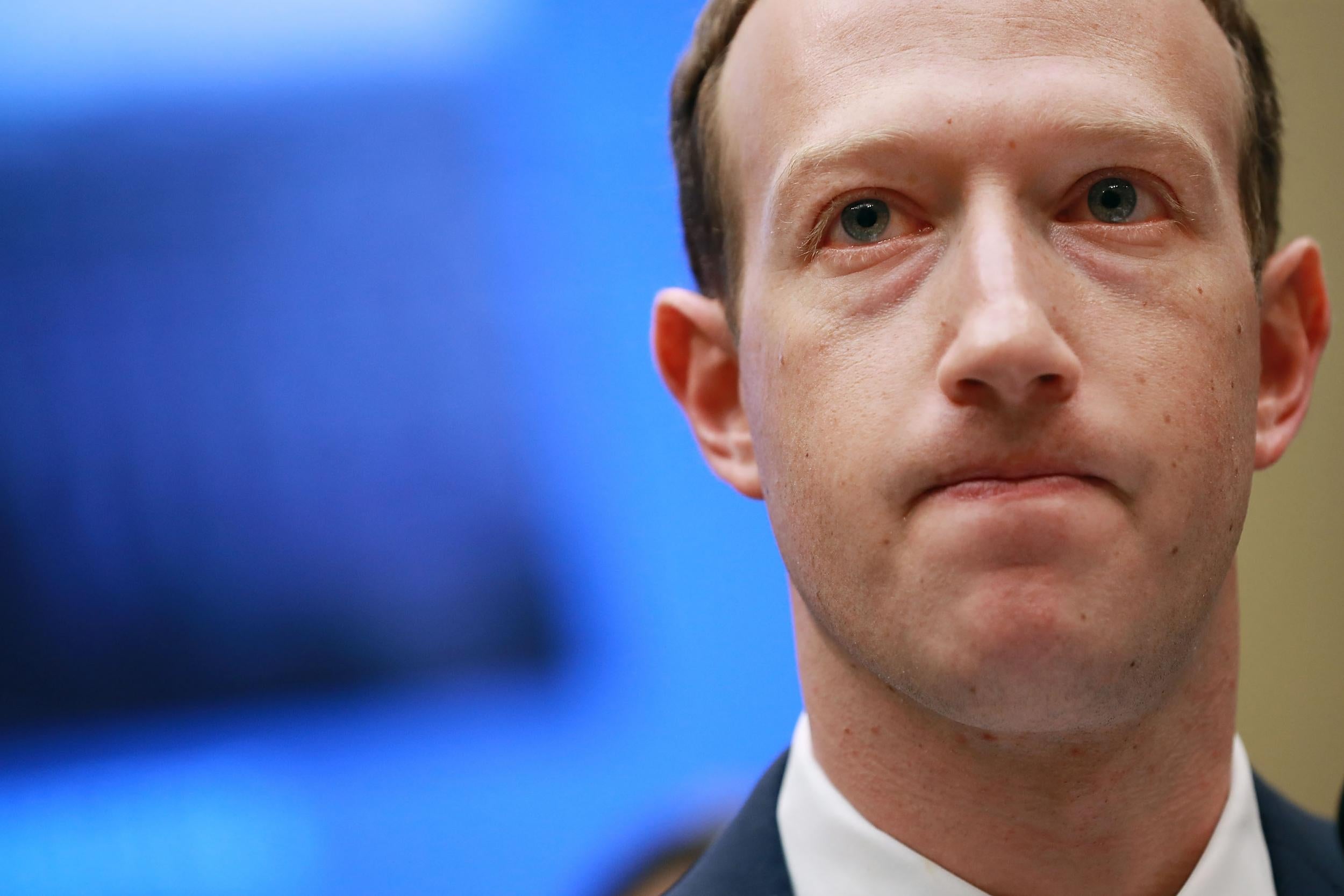Mark Zuckerberg dodges tough questions in second day of congress hearing
'It's time to ask whether Facebook may have moved too fast and broken too many things,' one representative says

Your support helps us to tell the story
From reproductive rights to climate change to Big Tech, The Independent is on the ground when the story is developing. Whether it's investigating the financials of Elon Musk's pro-Trump PAC or producing our latest documentary, 'The A Word', which shines a light on the American women fighting for reproductive rights, we know how important it is to parse out the facts from the messaging.
At such a critical moment in US history, we need reporters on the ground. Your donation allows us to keep sending journalists to speak to both sides of the story.
The Independent is trusted by Americans across the entire political spectrum. And unlike many other quality news outlets, we choose not to lock Americans out of our reporting and analysis with paywalls. We believe quality journalism should be available to everyone, paid for by those who can afford it.
Your support makes all the difference.Facebook CEO Mark Zuckerberg has endured a gruelling five-hour hearing before the US House of Representatives, facing tough questions about how the site protects user data, whether it is biased against certain users – and what, exactly, it is.
The second day of questioning before the House Committee on Energy and Commerce proved more taxing for the 33-year-old than his testimony before two Senate committees on Tuesday. Representatives shot rapid-fire questions at the entrepreneur, and even interrupted his answers at several points.
“While Facebook has certainly grown, I worry it has not matured,” Representative Greg Walden said at the opening of the hearing on Wednesday. “I think it is time to ask whether Facebook may have moved too fast and broken too many things.”
Much of the discussion surrounded Facebook’s handling of user data and privacy – a relevant line of questioning, as the meeting was called primarily to address the Cambridge Analytica scandal, in which a consulting company accessed millions of Facebook users’ data without their knowledge.
Mr Zuckerberg answered questions on a range of privacy issues, from third-party access to the creation of fake profiles. He reiterated several times that Facebook does not sell users’ information to advertisers.
In one particularly pointed exchange, Representative Frank Pallone asked Mr Zuckerberg to answer, with a “yes” or a “no,” whether he would change Facebook’s default privacy settings to collect the minimum amount of users’ personal information possible.
“This is a complex issue that deserves more than a one-word answer,” Mr Zuckerberg said.
“That’s disappointing to me,” Mr Pallone responded.
The entrepreneur’s answer was typical of his noncommittal, vague responses throughout the day. He declined to endorse any specific policy proposals during the hearing, though he did say it was “inevitable” that the internet would have to be regulated.
Senators Edward Markey and Richard Blumenthal introduced “privacy bill of rights” legislation to the Senate shortly before the hearing began. The act would require “edge providers” like Facebook and Google to obtain opt-in consent to use customers’ personal information. It would also force them to protect that information with “reasonable” measures.
Mr Zuckerberg faced pointed questions about the Cambridge Analytica scandal, in which the political consulting firm accessed data from up to 87m Facebook users – some of them without their consent. The data was collected and sold to the company by Aleksandr Kogan, a professor at Cambridge University.
On Wednesday, Mr Zuckerberg revealed that his own data had been accessed by Cambridge Analytica. He also said the data may have been sold to “a handful” of other firms as well, though he declined to mention their names. He claimed Facebook has asked these companies to delete the data in 2015, but that they may have retained it anyway.
Asked whether Facebook planned to sue Mr Kogan or Cambridge Analytica, Mr Zuckerberg said: “it’s something we’re looking into.”
Cambridge Analytica has denied breaking any laws, and said they properly licensed the data from Mr Kogan’s research company.
Mr Zuckerberg also faced a smattering of questions on other topics, including whether Facebook censored conservative voices on its platform. Several lawmakers brought up the case of video bloggers Diamond and Silk, who have complained that Facebook limited the reach of their videos and told them their content was “unsafe to the community”.
Representative Marsha Blackburn – a Republican whose campaign ad about “the sale of baby body parts” was temporarily blocked by Twitter last year – asked Mr Zuckerberg if Facebook manipulated its algorithms to prioritise or censor certain forms of speech.
“There are types of content like terrorism that I think we all agree we do not want to have on our service,” Mr Zuckerberg replied. “So we build systems that can identify those and can remove that content and we’re very proud of that work.”
“Let me tell you something right now, Diamond & Silk is not terrorism,” Ms Blackburn responded.
Mr Zuckerberg also responded to questions about whether he thought Facebook was a monopoly. He replied that he did not, and said that Americans used many other apps to communicate with each other. He failed to mention that Facebook owns three of the top 10 mobile apps used in the US, according to the data analytics site comScore.
At one point, Representative Greg Walden asked Mr Zuckerberg what, exactly, the massive company he had built was.
“I consider us to be a technology company,” Mr Zuckerberg said simply.
Join our commenting forum
Join thought-provoking conversations, follow other Independent readers and see their replies
Comments